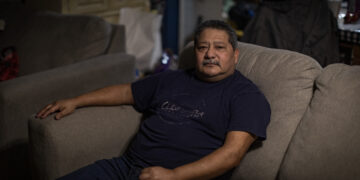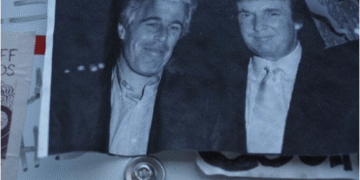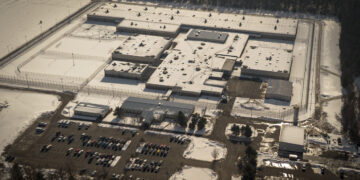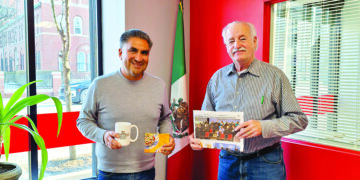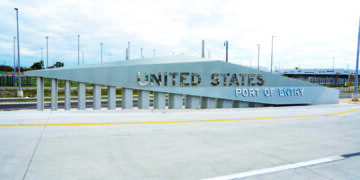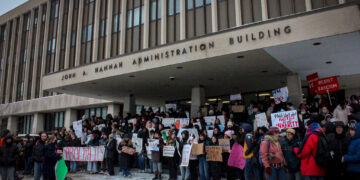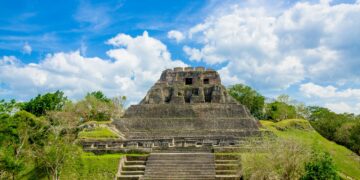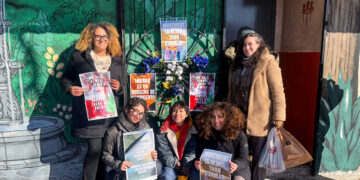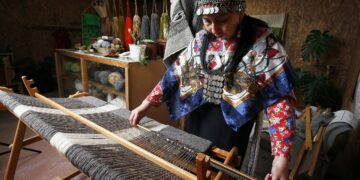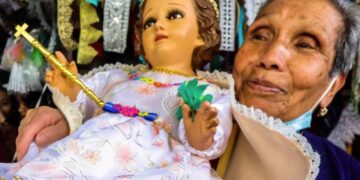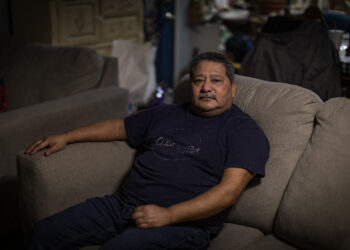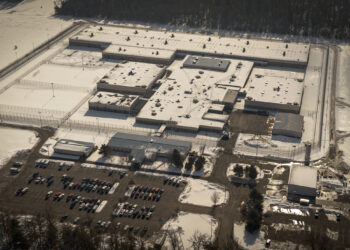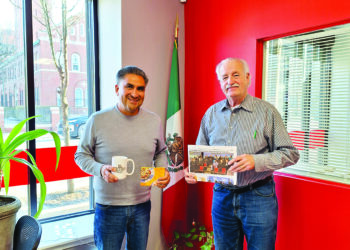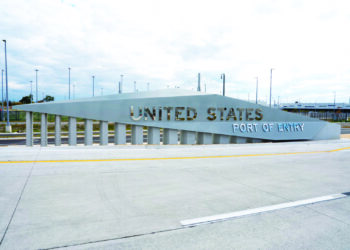Newly installed archbishop visits Holy Redeemer Parish in Southwest Detroit, celebrates first welcome Mass in Spanish
When Archbishop Edward J. Weisenburger began Mass on the evening of March 20 at Holy Redeemer Parish, the joy of the majority Hispanic congregation was palpable as the new chief shepherd of the Archdiocese of Detroit started the liturgy in Spanish.
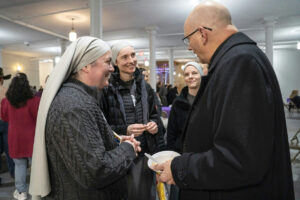
Archbishop Weisenburger was officially installed as the sixth archbishop of Detroit on Tuesday, March 18, and chose the Southwest Detroit parish as the site of his first parish Mass. The vibrant, multicultural community is located in the heart of Detroit’s Mexicantown and is served by the Society of Our Lady of the Most Holy Trinity (SOLT).
As he began his homily, Archbishop Weisenburger apologized for his Spanish and said he would deliver his message partially in both Spanish and English.
“I got goosebumps on my arms the moment he started speaking in Spanish,” lifelong parishioner Carmen Muñoz told Detroit Catholic. “I think the whole community felt welcome just by the fact that he spoke to everyone in Spanish.”
Muñoz said everyone with whom she spoke at a reception following Mass was also surprised.
Archbishop Weisenburger came to Detroit from the Diocese of Tucson, where he had served since 2017. The mission diocese borders Mexico and sees thousands of immigrants enter each year. Archbishop Weisenburger has been outspoken about the plight of migrants and has expressed support for the Hispanic community.
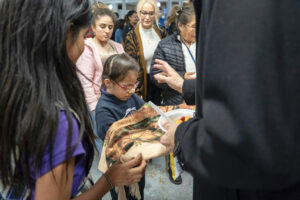
“There’s a joyfulness in Hispanic culture where they have really woven faith into their lives,” Archbishop Weisenburger said during a press conference March 18, before his installation Mass. “(Faith) doesn’t seem to have been bleached out the way it has been with secularism in so much of the western world. I find it is life-affirming for me when I get to spend time with the Hispanic community.”
Brenda Hascall, the Archdiocese of Detroit’s coordinator of Hispanic ministries, told Detroit Catholic she was moved when she learned Archbishop Weisenburger taught himself the Spanish language as he ministered to the Hispanic community.
While many members of the Detroit Hispanic community, especially children, are bilingual, Hascall said hearing someone speak even a couple of words in Spanish is inviting.
“I was looking at him during Mass, and he was singing with the people, and he knows the hymns, and you can see that they can relate to him,” Hascall said.
Hascall said having an archbishop who not only speaks the language, but values the diversity and beauty that Hispanic Catholics bring to the Church, gives her hope.
At the end of Mass, uniformed students from Holy Redeemer Grade School presented the new archbishop with a welcome gift basket. At the reception in his honor, parishioners lined up to greet him, take photos and receive blessings from Archbishop Weisenburger.
Pastor Fr. John Robinson, SOLT, said the Holy Redeemer community receives everyone with open arms, but as he looked around at the faces of his parishioners, it was apparent that the archbishop’s welcome was special and that the community was “overjoyed.”
Bernadette Re, who works in the school’s development office and serves as a missionary volunteer with the SOLT community, said the grade school students were excited to wear their uniforms at Mass and meet the archbishop.
“What I’ve come to see and know about Holy Redeemer is that the parishioners are so vibrant and dedicated to the Church, their community and to the faith,” Re said. “They love the Church so much, so I think that the validation of the archbishop seeing their witness of faith and their beautiful presence in the community is really special to them and think speaks a lot to their dedication.”
Geraldine Hernandez, the parish’s secretary of 31 years, said she “felt so much peace” during Mass with Archbishop Weisenburger and was also delighted and surprised when he introduced himself to her in Spanish.
“I feel like he’s going to be good to the city of Detroit and to the archdiocese, especially to the Hispanic community,” Hernandez said. “He is very charismatic, and we need someone like that who is going to speak Spanish, especially now. We are living in a difficult time, especially for the young people living away from the Church, so hopefully, he will bring people back to the Church, especially the young ones.”
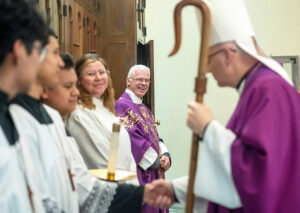
Antonio Guzmán-Díaz, archdiocesan coordinator of discipleship formation and a parishioner at Holy Redeemer, is hopeful Archbishop Weisenburger’s bilingualism will break down language barriers and draw attention to the needs and issues facing the Hispanic community, including immigration.
Guzmán-Díaz added that now, more than ever, the Church needs to draw closer to the migrant community, and Archbishop Weisenburger has already been a witness to this by caring for the community in Tucson.
“I think it’s a sign that he is a bishop who cares for the people he has been entrusted with, and it’s beautiful to see how he’s doing that pastoral care for the people who are being affected by this issue with immigration,” Guzmán-Díaz explained. “I think it’s an ongoing issue due to our broken immigration system, and I know there is not much more that he can do, but his presence does make a difference in the community and people’s lives.”
Archbishop Weisenburger’s presence alone gives people hope that the Church is listening to them, Guzmán-Díaz added, and other parishioners echoed the same sentiment.
“I think they are feeling supported and very close (to him) just by the fact that they can communicate (with him),“ Muñoz said. “I think that especially nowadays with what the whole Hispanic community is going through right now, they are going to feel supported by him. We are so excited; we continue to pray for him as he’s going to pray for Detroit.”
La comunidad hispana de Detroit celebra con alegría y esperanza el nombramiento del
El nuevo arzobispo celebra su primera Misa de bienvenida en español en la parroquia Holy Redeemer, en el suroeste de Detroit
Cuando el Arzobispo Edward J. Weisenburger comenzó la Misa en la tarde del 20 de marzo en la Holy Redeemer Parish, la alegría de la congregación, en su mayoría hispana, era evidente al ver que el nuevo pastor de la Arquidiócesis de Detroit iniciaba la liturgia en español.
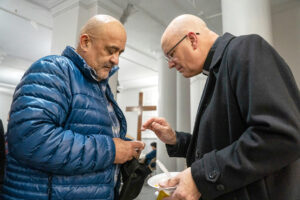
El Arzobispo Weisenburger fue instalado oficialmente como el sexto arzobispo de Detroit el martes 18 de marzo, y eligió la parroquia del suroeste de Detroit como el lugar para celebrar su primera Misa parroquial. Esta vibrante comunidad multicultural se encuentra en el corazón del Mexicantown de Detroit y está atendida por la Society of Our Lady of the Most Holy Trinity (SOLT).
Al comenzar su homilía, el Arzobispo Weisenburger se disculpó por su español y dijo que daría su mensaje tanto en español como en inglés.
“Se me puso la piel de gallina cuando empezó a hablar en español”, dijo Carmen Muñoz, feligresa de toda la vida, al Detroit Catholic. “Creo que toda la comunidad se sintió acogida por el simple hecho de que hablara a todos en español”.
Muñoz comentó que todas las personas con las que habló en la recepción después de la Misa también estaban sorprendidas.
El Arzobispo Weisenburger llegó a Detroit desde la Diócesis de Tucson, donde había servido desde 2017. Esta diócesis misionera, que limita con México, recibe miles de inmigrantes cada año. El Arzobispo Weisenburger ha sido un firme defensor de los migrantes y ha expresado su apoyo a la comunidad hispana.
“La cultura hispana tiene una alegría especial, donde la fe forma parte de la vida cotidiana”, expresó el arzobispo Weisenburger durante una conferencia de prensa el 18 de marzo, antes de su Misa de instalación. “La fe no parece haberse perdido como ha sucedido con el secularismo en gran parte del mundo occidental. Para mí, compartir tiempo con la comunidad hispana es una experiencia que da vida”.
Brenda Hascall, coordinadora de ministerios hispanos de la Arquidiócesis de Detroit, comentó a Detroit Catholic que se emocionó al saber que el arzobispo Weisenburger había aprendido español por su cuenta mientras servía a la comunidad hispana.
Aunque muchos miembros de la comunidad hispana de Detroit, especialmente los niños, hablan ambos idiomas, Hascall destacó que escuchar aunque sea unas pocas palabras en español genera un ambiente acogedor.
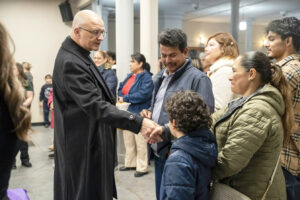
“Lo veía durante la Misa y estaba cantando junto a la gente; conoce los himnos, y se nota que la comunidad siente una conexión especial con él”, comentó Hascall.
Además, resaltó que tener un arzobispo que no solo hable el idioma, sino que valore la diversidad y la riqueza que los católicos hispanos aportan a la Iglesia, es motivo de esperanza.
Al finalizar la Misa, estudiantes uniformados de la Holy Redeemer Grade School le entregaron una canasta de bienvenida al nuevo arzobispo. Durante la recepción en su honor, los feligreses se acercaron para saludarlo, tomarse fotos y recibir su bendición.
El padre John Robinson, SOLT, párroco de Holy Redeemer, comentó que la comunidad siempre recibe a todos con los brazos abiertos, pero al ver la expresión de sus feligreses, quedó claro que la llegada del arzobispo fue algo especial y que la comunidad estaba “llena de alegría”.
Bernadette Re, quien trabaja en la oficina de desarrollo de la escuela y es voluntaria misionera con la comunidad SOLT, comentó que los estudiantes de la escuela primaria estaban emocionados de usar sus uniformes durante la Misa y conocer al arzobispo.
“Algo que he aprendido sobre Holy Redeemer es que los feligreses son muy activos y comprometidos con la Iglesia, su comunidad y su fe”, dijo Re. “Aman tanto a la Iglesia que el hecho de que el arzobispo reconociera su testimonio de fe y su hermosa presencia en la comunidad fue algo muy especial para ellos. Creo que eso dice mucho sobre su entrega”.
Geraldine Hernández, secretaria de la parroquia desde hace 31 años, comentó que sintió “mucha paz” durante la Misa con el Arzobispo Weisenburger y que le causó alegría y sorpresa cuando él se presentó en español.
“Siento que va a hacer mucho bien en la ciudad de Detroit y en la arquidiócesis, especialmente para la comunidad hispana”, expresó Hernández. “Es muy carismático, y necesitamos a alguien así que hable español, especialmente en este momento tan difícil. Los jóvenes se están alejando de la Iglesia, y ojalá él pueda atraerlos de nuevo, especialmente a los más jóvenes”.
Antonio Guzmán-Díaz, coordinador arquidiocesano de formación de discípulos y feligrés de Holy Redeemer, expresó su esperanza de que el bilingüismo del Arzobispo Weisenburger ayude a romper las barreras del idioma y llame la atención sobre las necesidades y problemas que enfrenta la comunidad hispana, incluyendo la inmigración.
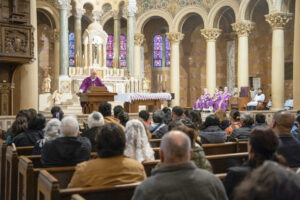
Guzmán-Díaz agregó que ahora más que nunca, la Iglesia necesita acercarse a la comunidad migrante, y el Arzobispo Weisenburger ya ha sido testigo de esto al cuidar de la comunidad en Tucson.
“Esto demuestra que es un obispo que se preocupa por la gente que le ha sido confiada, y es hermoso ver cómo está llevando a cabo ese cuidado pastoral con las personas afectadas por la cuestión de la inmigración,”, explicó Guzmán-Díaz. “Es un problema recurrente debido a un sistema migratorio que no funciona. Si bien no hay mucho más que él pueda hacer, su presencia marca una diferencia en la comunidad y en las vidas de las personas”.
La sola presencia del Arzobispo Weisenburger da a la gente la esperanza de que la Iglesia los escucha, añadió Guzmán-Díaz, y otros feligreses dijeron lo mismo.
“Creo que se sienten apoyados y muy cercanos (a él) por el mero hecho de que pueden comunicarse (con él)”, dijo Muñoz. “Creo que, especialmente hoy en día, con lo que está atravesando toda la comunidad hispana en estos momentos, se van a sentir apoyados por él. Estamos muy emocionados; seguimos rezando por él del mismo modo que él va a rezar por Detroit”.

